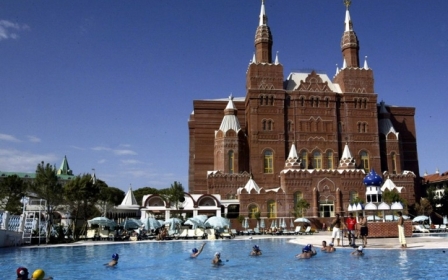Turkey must stop blocking NGO access to war-torn southeast: HRW

The Turkish government is preventing NGOs, lawyers and journalists from accessing the war-torn southeastern region, according to rights groups, leading to accusations of a cover-up of abuses by state forces.
Human Rights Watch on Monday said that a number of NGOs had been denied access to areas in the Kurdish-majority southeast, where a series of curfews and media blackouts have been imposed by Turkish security forces currently fighting Kurdish militants linked to the Kurdistan Workers Party (PKK).
It said that the curfews had prevented “non-governmental organisations, journalists, and lawyers from scrutinising those operations or any resulting abuses by security forces or armed groups,” adding that the authorities had also “blocked rights groups – including Human Rights Watch, Amnesty International and Physicians for Human Rights – from trying to document abuses even after curfews and operations ended".
Curfews in the southeast are usually in place around the clock, restricting freedom of movement - they have been likened by activists to a state of siege.
Emma Sinclair-Webb, senior Turkey researcher at Human Rights Watch (HRW), warned that the actions of the security forces fuelled speculation of a “cover-up”.
“The Turkish government should give the UN and non-governmental groups immediate access to the area to document what’s going on there,” she said.
A senior Turkish official told MEE that the report was "inaccurate and misleading".
The lack of independent media and NGO access to the southeast means that information on the extent of the human cost and structural damage caused by the fighting in the southeast, which flared up after the collapse of a ceasefire between the PKK and the Turkish state in July 2015, has been very sketchy.
According to Turkish President Recep Tayyip Erdogan, between July 2015 and June 2016 more than 7,600 Kurdish militants were “neutralised” across Turkey and northern Iraq, where the PKK’s headquarters are based.
However, the PKK leadership has heavily disputed this figure - the International Crisis Group, meanwhile, claims that 1,498 people, including at least 271 civilians, have been killed in Turkey alone between July 2015 and June 2016.
HRW has previously criticised the Turkish government for its “disproportionate use of force” in the southeast, sentiments echoed by other human rights bodies.
In May, UN human rights chief Zeid Raad Hussein called on the Turkish government to respect international laws in during operations in the southeast.
"While Turkey has a duty to protect its population from acts of violence, it is essential that the authorities respect human rights at all times while undertaking security or counter-terrorism operations – and international law prohibiting torture, extrajudicial killings, disproportionate use of lethal force and arbitrary detention must be observed," he said in a statement.
Turkey has not responded to Zeid's statement, but - according to HRW - the government has indicated that he himself would be welcome to visit the region.
The conflict between the Turkish state and the PKK has been ongoing since 1984, with more than 40,000 people killed and reports of human rights abuses by both sides.
Stay informed with MEE's newsletters
Sign up to get the latest alerts, insights and analysis, starting with Turkey Unpacked
Middle East Eye delivers independent and unrivalled coverage and analysis of the Middle East, North Africa and beyond. To learn more about republishing this content and the associated fees, please fill out this form. More about MEE can be found here.




